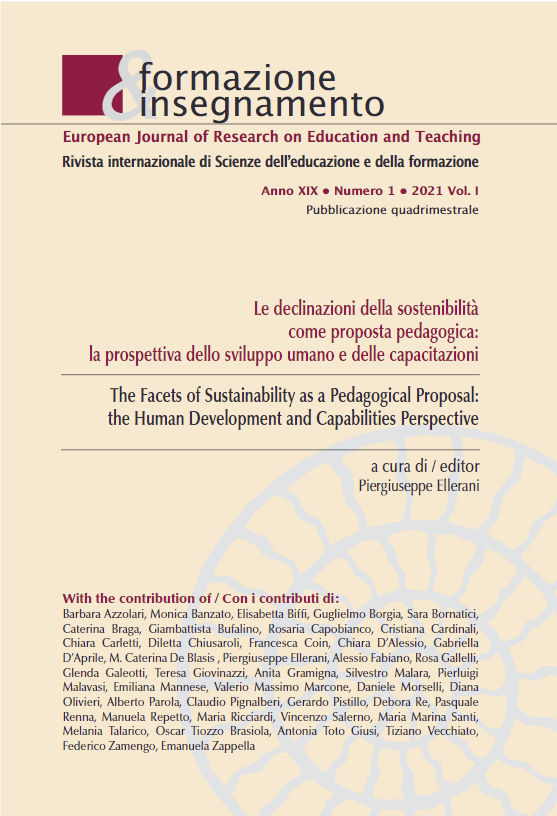The path of transformation towards the new“normal” in the time of Covid-19: from the pedagogy of vulnerability to the pedagogy of resilience
DOI:
https://doi.org/10.7346/-fei-XIX-01-21_26Keywords:
COVID-19, Vulnerability, Pedagogic frailty, Positive pedagogy, ResilienceAbstract
At critical moments such as that of the Covid-19 pandemic, vulnerability and fragility emerge, even in the field of pedagogy. This paper, through a multidisciplinary approach, aims to examine the desired transition from a pedagogy of vulnerability to a pedagogy of resilience, from a perspective in which the focus is on the creative and transformative potential of the individual and the community.
References
Arslan, G., Yıldırım, M., Tanhan, A., Bulu, M., & Allen, K.-A. (2020). Coronavirus Stress, Optimism-Pessimism, Psychological Inflexibility, and Psychological Health. Int J Ment Health Addiction, 1-17. https://doi.org/10.1007%2Fs11469-020-00337-6
Beck, U. (2000). La società del rischio. Verso una seconda modernità. Roma: Carocci.
Beltman, S., Mansfield C.F. & Price A. (2011). Thriving Not Just Surviving: A Review of Research on Teacher Resilience. Educ Res Rev, 6: 185-207. http://dx.doi.org/10.1016/j.edurev.2011.09.001
Bertolini, P., & Caronia, L. (2015). Ragazzi difficili. Pedagogia interpretativa e linee di intervento. Milano: FrancoAngeli.
Bhamra, R., Dani, S. & Burnard, K. (2011). Resilience: The concept, a literature review and future directions. Int J Prod Res, 49: 5375-5393. https://doi.org/10.1080/00207543.2011.563826
Blaikie, P., Wisner, B., Cannon, T. & Davis, I. (2004). At risk: natural hazards, people’s vulnerability and disasters. London: Routledge.
Brooks, S. K., Webster, R. K., Smith, L. E., Woodland, L., Wessely, S., Greenberg, N., & Rubin, G. J. (2020). The psychological impact of quarantine and how to reduce it: Rapid review of the evidence. Lancet, 395, 912-20. https://doi.org/10.1016/S0140-6736(20)30460-8
Brown, B. (2012). Daring Greatly. How the courage to be vulnerable transforms the way we live, love, parent and lead. New York: Penguin Books.
Canevaro, A. (2007). L’integrazione scolastica degli alunni con disabilità. Trento: Erickson.
Canning, J. (2007). Pedagogy as a Discipline: Emergence, Sustainability and Professionalisation. Teach High Educ, 12: 393-403. https://doi.org/10.1080/13562510701278757
Childers, D. L., Pickett, S. T. A., Grove, J. M., Ogden, L., & Whitmer, A. (2014). Advancing urban sustainability theory and action: challenges and opportunities.Lands Urban Plan, 125: 320-328. https://doi.org/10.1016/j.landurbplan.2014.01.022
Clegg, A., & Young, J. (2011). The Frailty Syndrome. Clin Med, 11: 72-75. https://doi.org/10.7861/clinmedicine.11-1-72
De Clercq, M. & Lebigot, F. (2001). Les traumatismes psychiques. Paris: Masson. https://www.cairn.info/stress-traumatismes-et-insomnies--9782842541750-page-51.htm
Desmet, H., & Pourtois, J.-P. (2005). Culture et bientraitance. Bruxelles: De Boeck.
Di Blasio, P. (Ed.). (2005). Tra rischio e protezione. La valutazione delle competenze parentali. Milano: Unicopli.
Falaschi, E. (2019). The epistemological challenge of the “pedagogy of talents”: educating for resilience in order not to waste social capital. SF, 22: 197-214. https://doi.org/10.13128/ssf-10795
Freire, P. (2008). Pedagogia della speranza. Torino: EGA.
Giroux, H. (2011). On Critical Pedagogy. London: CIP.
Hedlund-de Witt, A. (2012). Exploring worldviews and their relationships to sustainable life-styles: Towards a new conceptual and methodological approach. Ecol Econ, 84: 74-83. https://doi.org/10.1016/j.ecolecon.2012.09.009
Hobfoll, S. E. (1989). Conservation of Resources: A New Attempt at Conceptualizing Stress. Am Psychol, 44: 513-524.
Ianes, D. (2013). La speciale normalità. Trento: Erickson.
Isidori, M. V. (2011). Educatamente con l’emergenza. Roma: Monolite.
Kinchin, I. M. (2015). Pedagogic Frailty: An Initial Consideration of Aetiology and Prognosis. Paper presented at the annual SRHE Conference, Celtic Manor, Wales, December 9-11. Retrieved on January 1, 2016 from https://srhe.ac.uk/arc/conference2015/abstracts/0026.pdf
Kinchin, I. & Winstone N. (Eds.). (2017). Pedagogic frailty and Resilience in the University. Rotterdam: Sense. https://doi.org/10.1007/978-94-6300-983-6_15
Lewis, J. & Kelman I. (2010). Places, people and perpetuity: community capacities in ecologies of catastrophe. ACME, 9: 191-220. Retrieved on January 1, 2016 from https://acme-journal.org/index.php/acme/article/view/866
Loughran, J. (2006). Developing a pedagogy of teacher education. London: Routledge.
Luhmann, N. (1996). Sociologia del rischio. Milano: Mondadori.
Malaguti, E. (2005). Educarsi alla resilienza. Trento: Erickson.
Massa, R. (2004). La clinica della formazione. In R. Massa. R. (Ed.), La clinica della formazione: un’esperienza di ricerca. Milano: FrancoAngeli.
Masten, A. S. (2001). Ordinary magic: resilience processes in development. Am Psychol, 56: 227-238. https://psycnet.apa.org/doi/10.1037/0003-066X.56.3.227
Netolicky, D. M. (2020). Transformational Professional Learning. Making a difference in schools. Abingdon: Routledge.
Norris, F. H., & Kaniasty, K. (1996). Received and perceived social support in times of stress: a test of the social support deterioration deterrence model. J Pers Soc Psychol, 71: 498-511. https://doi.org/10.1037//0022-3514.71.3.498
Rosa, H. (2013). Social acceleration: A theory of modernity. New York: CUP.
Santini, C. (2018). Kintsugi: L’arte segreta di riparare la vita. Milano: Rizzoli.
Shulman, L. S. (2005). Pedagogies of Uncertainty. Liberal Educ, 91.
Smelser, N. J. (2011). Manuale di Sociologia. Bologna: Il Mulino.
Thompson, J. B. (2020). Mediated interaction in the digital age. Theory Cult Soc, 37: 3-28. https://doi.org/10.1177/0263276418808592
Tomarchio, M., & Ulivieri, S. (2015). Pedagogia militante. Diritti, culture, territori. Pisa: ETS.
Tramma, S., & Kanizsa, S. (Eds.). (2010). Introduzione alla pedagogia e al lavoro educativo. Roma: Carocci.
Traverso, A. (2018). Emergenza e progettualità educativa. Da un modello allarmista al modello trasformativo. Milano: FrancoAngeli.
Vaccarelli, A. (2016). Le prove della vita: promuovere la resilienza nella relazione educativa. Milano: FrancoAngeli.
Vanistendael, S., & Lecomte J. (2000). Le bonheur est toujours possible. Paris: Bayard.
Vaughn, D. (1997). The Challenger Launch Decision: Risky Technology, Culture, and Deviance at NASA. Chicago: UCP.
White, G. F. (1945). Human adjustment to floods. Research paper 29. Department of geogra-phy, University of Chicago.
Winstone, N. (2017). The ‘3Rs’ of Pedagogic Frailty: Risk, Reward and Resilience. In I. Kinchin & N. Winstone (Eds.), Pedagogic Frailty and Resilience in the University. Rotterdam: Sense.
Downloads
Published
How to Cite
Issue
Section
License
Copyright (c) 2021 Pensa MultiMedia

This work is licensed under a Creative Commons Attribution 4.0 International License.
Formazione & insegnamento is distributed under Attribution 4.0 International (CC BY 4.0).
For further details, please refer to our Repository & Archiving Policy, as well as our Copyright & Licensing Terms.





